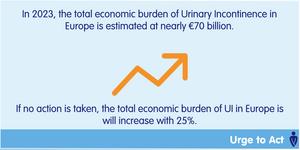image:
If nothing is done, the annual economic burden of urinary incontinence could reach €87 billion in 2030
view more
Credit: European Urological Association
Brussels, November 8, 2023 – A new international study on the economic burden of urinary incontinence has revealed that the cost of incontinence care will reach an estimated €69.1 billion in 2023. These costs include the impact of incontinence on an individual’s health, the cost of medical consultations and products such as incontinence pads. , incontinence-related absenteeism at work, nursing home placement, and the impact of incontinence care on the environment. If measures are not taken to support incontinence health, the economic burden could reach 86.7 billion euros in 2030, an increase of 25%. This financial burden is considerably higher when caregiver costs are included.
Approximately 55 to 60 million Europeans have problems with their incontinence health (the ability to control their bladder and bowels). However, the health, economic, and environmental burdens caused by urinary incontinence (UI) are largely unknown. The European Association of Urology, together with 22 stakeholders, has launched Urge to Act, a campaign aimed at achieving significant changes in incontinence policy across Europe. The campaign will be launched at the first European Continental Health Summit in Brussels on 8 November.
At the summit, a first-of-its-kind socio-economic report presented the burden of UI prevalence, healthcare costs and environmental impacts in European Union countries (EU) from 2023 to 2030. The report demonstrates that: Across EU member states, the economic burden of UI in 2023 is estimated at €69.1 billion. The financial burden for women is four times that of men, and when informal support from caregivers is taken into account, the financial burden increases by 16%. Regarding the disposal of incontinence pads, the cost of incineration (burning the pads) was slightly lower than recycling. However, the carbon footprint of recycling is significantly lower.
The economic analysis presented in this report estimates that without action, the economic burden of UI could increase by 25%, reaching €86.7 billion in 2030. Without awareness, prevention, treatment, and thoughtful utilization of incontinence techniques and resources when this occurs, chronic diseases are often incurable and the economic burden is likely to increase.
In order to offer solutions, a manifesto for policy reforms on the transformation of EU excretory medicine will be published in parallel. The manifesto, supported by 23 organizations, calls for concrete policy changes to address the challenges raised by the report, recognizing the importance of patient-centred incontinence care and improving the overall understanding of continence care. It provides 10 high-level recommendations to European and national policy makers to promote The complex relationship between incontinence health and healthy aging, women’s health, and disease areas such as cancer, mental health, neurological problems, and several other comorbidities such as obesity. This requires increased funding for health research on incontinence.
Professor Philippe van Kerebroek, co-chair of the European Association of Urology Policy Office and a leading expert in the field of incontinence, said: It has a serious negative impact on an individual’s quality of life. The physical, psychosocial, and economic effects on patients and their caregivers create barriers to full participation in society. Optimal continence health should be a reality for everyone. ”
As the risk of incontinence problems is often correlated with symptoms that develop or worsen with age, these problems are expected to further increase as Europe’s population ages rapidly. Health professionals and informal caregivers are making every effort to work within the existing constraints of various health systems. However, current systems are not yet fully adapted to support incontinence care. Policies and legislation in both EU and non-European countries tend to ignore incontinence care, despite its prevalence, serious nature, and availability of solutions.
Van Kellebroek: “To address the incontinence health challenge facing Europe, the time is now to take action and transform this neglected issue. Our Urge to Act” The campaign aims to remind policymakers that there are many ways to improve incontinence health, including through increased prevention, better care, access to supportive interventions including treatment, and more inclusive environments. I would like to. More needs to be done to reduce direct spending and the burden on patients, their carers and society. ”
Disclaimer: AAAS and EurekAlert! We are not responsible for the accuracy of news releases posted on EurekAlert! Use of Information by Contributing Institutions or via the EurekAlert System.
